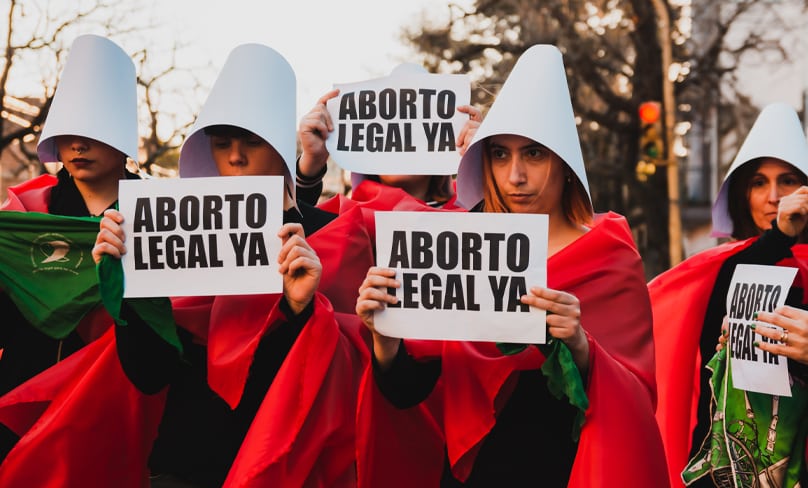
It would be ridiculous to see a person holding a sign outside of a liquor store or bottle shop reading “No forced hangovers” or a man standing next to a vegetable vendor at the farmers market with a sign reading “No forced flatus.”
Even more absurd would be a bloke holding a “No forced death” sign outside of a cemetery.
Yet, “No forced births” is the latest slogan coming from the pro-abortion/pro-choice camp.
The origins of the “no forced birth” phrase comes from the dystopic novel and TV show The Handmaid’s Tale, where the US is now a dystopic society and legally treats fertile women (handmaids) as property.
The handmaids, we learn, are required by law, albeit an evil and immoral law, to have sex with their male owners, and if they become pregnant, they are required by law to carry the child to term.
The handmaids’ owners then force the handmaids to forfeit the birthed child.
From the perspective of the handmaids and pro-abortionists, the dystopic US laws force the handmaids to give birth.
The question is, is it true in society today? If Australia or the US makes abortion illegal tomorrow, are women then forced into giving birth because they are pregnant?
If we take a glance at how human biology works, we know from our health classes that a natural and healthy pregnancy ends at birth.
However, before we answer the questions, we might ask the forced birthers about other biological processes to see if their test of being forced equates.
Are women forced to eat when their stomach is empty? Are women forced to sleep when they are tired?

What if our country passes a law tomorrow that said no empty stomachs, are we then being forced to eat?
So, are women forced to give birth? Normal and healthy biological functions require that pregnancy ends in birth; so, even if we could say that a woman is forced into birthing, it is not because of government laws as portrayed in The Handmaid’s Tale.
The kind of forcing that happens is akin in the same way hunger requires a person to eat, and tiredness requires a person to sleep.
Then what the forced birthers seem to want is a rebellion against biology.
However, the forced birth argument isn’t really about forced birthing or biology. Those are only red herrings.
The argument is about forced conception, whose natural consequence is birth.
So the motto should go “No Forced Conception,” but this is absurd and does not strike the same emotional chord as “No Forced Birth,” for no one is being forced, except maybe in the case of rape, to conceive. Still, we get closer to the real argument at hand.
Because forced birth is about forced conception, we now know that autonomy, consent, and responsibilities for one’s actions are at the core of these “forced birth” protests.
What the forced birthers are actually saying and mean is “No one should force a woman to give birth to a child to which she did not consent to conceive regardless of a wilful decision to engage in an activity that may result in conception and later birth.”
In other words, she does not want to take responsibility for her actions because she did not give autonomous consent to being pregnant.
This line of thinking is like protesting drunkenness because someone did not give her free consent to alcohol to make her drunk even though she drank an entire bottle of gin in an hour.
Therefore, to put it differently, the woman who believes she is forced to give birth has confused pregnancy, and human biology, with Apple’s terms and conditions.
Maybe she was absent on that day in health class when her teacher explained the birds and the bees.
However, suppose we keep this metaphor going. In that case, those who promote abortion from the forced birth line of reasoning seem to say that the only way to void Apple’s terms and conditions after purchase or use of the product is to destroy the Apple product.
Finally, I’d like to remind the forced birthers that to consent to sex, is to consent to all the biological processes that may follow, so, before engaging in sex, take a good long think about whether you do or can consent to what might follow.
Related articles:
